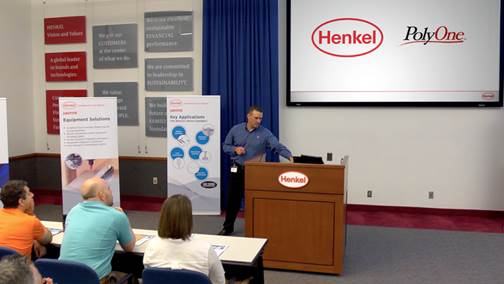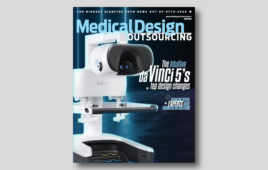
Caption: Henkel and PolyOne hold technical training sessions with major medical device manufacturers. These collaborative, hands-on sessions educate customers on key decision criteria related to polymer selection, joint design and adhesive selection.
ROCKY HILL, Conn., Sept. 19, 2016 – Adhesive manufacturer Henkel Corporation and plastic supplier PolyOne Corporation are collaborating on the development of new materials and assembly methods for medical devices that are more resistant to the harsher disinfectants now in use in hospitals. This collaboration provides higher-performing solutions, shortens development time and speeds up manufacturing processes.
In a new video, Henkel and PolyOne discuss their joint approach to product development for the medical device market. Plastics suppliers like PolyOne are developing new polymer blends, such as co-polyesters and acrylics, to ensure that medical devices withstand exposure to harsher environments. Henkel works closely with PolyOne to test its LOCTITE brand adhesives with these new plastics to provide a complete disinfectant-resistant solution for devices such as ultrasound equipment, oncology delivery systems, infusion pumps, hand-held scanners, portable respiratory equipment, IV/infusion bags and instrument brackets/poles, patient monitors, hospital beds and other equipment used in hospital surgical and patient rooms.
Reducing R&D time
By evaluating and testing various LOCTITE adhesive and substrate combinations in its labs, Henkel helps suppliers like PolyOne provide pre-evaluated substrate and assembly method solutions to their medical device customers. Offering pre-evaluated solutions helps reduce their customer’s research and development time. “Working with Henkel, we’ve been able to develop chemistries that allow us not only to address the harshness of the environments being experienced at the hospital, but the adhesives that are needed to bond these materials together,” said Jared Goble, Sales Director, Healthcare, PolyOne. “As these materials are more chemically resistant, it makes it harder for medical device manufacturers to assemble the device.”
To provide more value to medical customers, Henkel collaborates with leading polymer suppliers like PolyOne to share industry knowledge and assist with early-stage design and development. This combined effort provides customers with the expertise of two complementary suppliers whose products work together in the assembly of medical devices. By pre-qualifying new plastic and adhesive combinations, time and resource deployment are taken out of the selection process. This helps device manufacturers to introduce innovation faster and deliver devices with robust design and increased patient safety.
Henkel also holds technical training sessions with key plastics producers at major medical device manufacturers around the world. These collaborative, hands-on sessions educate customers on key decision criteria related to polymer selection, joint design and adhesive selection. The goal is to help customers improve their medical device designs and optimize their manufacturing processes.
Jason Spencer, Global Market Development Manager at Henkel, said, “We’re working with key suppliers like PolyOne to help provide solutions that are meaningful to the customer, to help them take cost out of their overall process and shorten their development time, which ultimately allows them to be more successful.”
For more information, call 1-800-LOCTITE, visit www.na.henkel-adhesives.com/medical, or contact Christine Marotta, Market Development Manager, at christine.marotta@henkel.com.




![A photo of the Medtronic GI Genius ColonPro polyp detection system flagging a potential sign of colon cancer during a colonoscopy. [Photo courtesy of Medtronic]](https://www.medicaldesignandoutsourcing.com/wp-content/uploads/2024/04/Medtronic-GI-Genius-doctors-268x170.jpg)